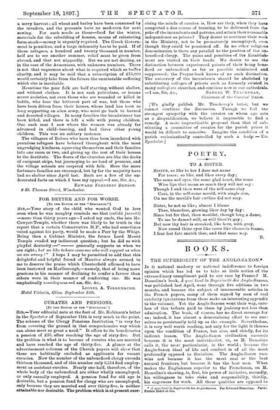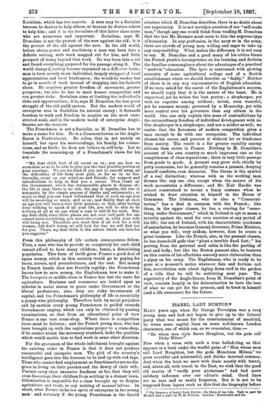BOOKS.
THE SUPERIORITY OF THE .A.NGLO-SAXON.*
Is it national modesty or national indifference to foreign opinion which has led us to take so little notice of the extraordinary compliment paid to our race by France? N. Deinolins's book, I quoi tient la Sup6riorite des Anglo-Saxons, was published last April, went through five editions in two months, and became the subject of innumerable articles in the French papers, many of them signed by men of real celebrity (quotations from these make an interesting appendix to the volume). Yet the Anglo-Saxons went their way, care- less of this tribute paid to them by jealousy not less than admiration. The book, of course, has no direct message for us ; indeed, it has almost a demoralising effect to see our- selves so persistently held up as the example. Nevertheless, it is very well worth reading, not only for the light it throws upon the condition of France, but also, and chiefly, for its indirect lesson. The Anglo-Saxon civilisation succeeds because it is the most individualist, or, as N. Demolins calls it, the most particularist, in the world ; because the Anglo-Saxon ideal of life and conduct is of all the most profoundly opposed to Socialism. The Anglo-Saxon race wins not because it has the most coal or the best natural frontiers, but because it has the best men. What makes the Englishman superior to the Frenchman, on N. Demolins's showing, is, first, his power of initiative, secondly, his willingness to take risks and responsibility, thirdly, his eagerness for work. All these qualities are opposed to • A quoi tient la SupErioriti des Anglo-Saxons. Far Edmond Demolins. Paris: Firrain Didot at Cie.
SJcialism, which has two aspects. A man may be a Socialist because he desires to help others, or because he desires others to help him ; and it is the Socialists of this latter class alone who are numerous and important. Socialism, says M. Demolins, is not the protest of the new against the old; it is the protest of the old against the new. In the old world, before steam.power and machinery, a man was born into a definite setting, with work mapped out for him, and little prospect of rising beyond that work. He was born into a rut and found everything prepared for his passage along it. The world changed, society became organised on a different basis ; man is born merely as an individual, largely stripped of local opportunities and local hindrances ; the would-be worker has to go in search of work instead of stepping into his father's shoes. He acquires greater freedom of movement, greater prospects ; but also he has to meet keener competition and run greater risks. Socialism aims at limiting the individual's risks and opportunities ; it is, says M. Demolins, the last great struggle of the old guild system. But the modern world of enterprise sees in Socialism its natural enemy ; it demands freedom to work and freedom to acquire on the most unre- stricted scale, and in the modern world of enterprise Anglo. Saxons are the masters.
The Frenchman is not a Socialist, so M. Demolins has to make a name for him. He is a Communitarian as the Anglo- Saxon is Particularist. He relies, that is, not merely on himself, but upon his surroundings, his family, his connec- tions, and so forth; he does not believe in self-help. Let us translate the summing-up of a Frenchman's views for his SOD :—
"My dear child, first of all count on us ; you see how we economise so as to be able to give you the best possible portion at your marriage. We are too fond of you not to smooth away all the difficulties of life from your path, so far as in us lies. Secondly, count on our relations and friends, for support and introductions to help to find you a career. Then count on the Government, which has innumerable places to dispose of ; the life is easy, there is no risk, the pay is regular, the rise is automatic by the simple process of deaths and retirements ; so much so that you can know beforehand that at such an age you will be receiving so much, and so on ; and finally that at such an age you will have a nice little pension; so that, after having done nothing to speak of all your life, you will be able to do nothing at all at an age when a man is still fit for work. But, my dear child, since these places are not over well paid, for one cannot have everything, you must also count on what your wife will bring you. Therefore you must first of all look for a rich woman ; but don't worry, we will look for her, we will find her for you. There, my dear child, is the advice which our love for you suggests."
From this philosophy of life certain consequences follow. First, a man who has to provide so completely for each child cannot afford to have many children; hence, a diminishing population. This form of thrift gives France a good deal of spare money, which in this country would go to paying for boots, nurses, and perambulators, and the rest. But money in French hands does not fructify rapidly; the Frenchman knows how to save money, the Englishman how to make it. The bourgeois or middle class in France has lost the taste for
agriculture. Business and commerce are looked upon as inferior in social status to posts under Government or the liberal professions ; also, they are risky investments of capital, and the Frenchman's philosophy of life is essentially a penny-wise philosophy. Therefore both by social prejudice and by caution every young Frenchman is guided towards Government employ, which can only be obtained by passing examinations, so that from an educational point of view France is one vast cram-shop. Where there is competition there must be failures ; and the French young man, who has been brought up with the aspirations proper to a cram-shop, if he cannot attain the necessary standard, lacks the qualities which would enable him to find work in some other direction.
For the gravamen of the whole indictment brought against the existing order in France is that it does not produce resourceful and energetic men. The pick of the country's intelligence goes into the bureaux to be tied up with red tape.
Those who cannot find employment as functionaries see no dis- grace in living on their parents and the dowry of their wife. Parents carry their excessive fondness so far, that they will even discourage their children from settling in a distant town. Colonisation is impossible for a class brought up to despise agriculture and trade, to say nothing of manual labour. In short, what France lacks is a spirit of enterprise in her young men • and certainly if the young Frenchman is the flaccid
creature which M. Demolins describes, there is no doubt about our superiority. It is not merely a question of our "self-made man," though any one would think from reading M. Demolins that the late Mr. Barnet° must seem to him the supreme type of humanity. In any profession, in the navy or in the army, there are crowds of young men willing and eager to take nia any responsibility. What makes the difference it is not easy to say. M. Demolins and a good many of his critics blame the French youth's incompetence on his training, and declaina the familiar commonplaces about the advantages of a practical " modern" education. The lyaie is contrasted with glowing accounts of some agricultural college and of a Scotch establishment which we should describe as "faddy." Neither of these is in any way representative of English education. If we were asked for the secret of the Englishman's success, we should reply that it is the nature of the beast. He is unpoetical, yet he writes the best poetry; a shopkeeper, yet with no superior among soldiers ; lavish, even wasteful, yet he amasses money; governed by a Monarchy, yet with more control over his governors than any citizen in the. world. One can only explain this mass of contradictions by the extraordinary freedom of individual development with us. Our shopkeeper is a shopkeeper, and not a soldier as well; we realise that the fierceness of modern competition gives a man enough to do with one occupation. The individual chooses his career, and pursues it without let or hindrance from society. The result is a far greater equality among citizens than exists in France. Nothing in M. Demoline's account of his own country so much impresses one as the completeness of class separations ; there is very little passage from grade to grade. A peasant may grow rich, chiefly by petty economies, but he generally remains a peasant, denying' himself comforts, even decencies. The blouse is the symbol of a real distinction; whereas with us the working man dresses like any one else, except when the nature of his work necessitates a difference ; and Mr. Beir Hardie was almost constrained to invent a fancy costume when he wished to draw attention to himself in the House et Commons. The Irishman, who is also a " Comtnuni- tarian," has a deal in common with the French ; like them, in the upper classes, he has a craving for "some- thing under Government," which in Ireland is apt to mean a security against the need for over exertion at any period of his life ; but out of Ireland, with his characteristic quickness of assimilation, he becomes General, Governor, Prime Minister, or what you will; very seldom, however, does he create a great business. Like the French, also, in the peasant classes,. he has household gods that "plant a terrible fixed foot;" his parting from the paternal mud cabin is like the parting of soul and body; but like the Breton peasant also, he bestows on this centre of his affections scarcely more elaboration than a gipsy on his camp. The Englishman, who is ready to be gone at a moment's notice wherever fate and fortune call him, nevertheless sets about laying down turf in the garden of a villa that he will be subletting next year. The superiority of the Anglo-Saxon, from M. Demolins's point of view, consists largely in his determination to have the best. of what he can get for the present, and to trust in himself (and a life assurance) for the future.



































 Previous page
Previous page